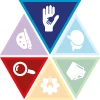Mediator

Mediators should be capable of:
- Providing personal assistance, medical attention, emotional support, or other personal care to others such as coworkers, customers, or patients.
- Developing constructive and cooperative working relationships with others, and maintaining them over time.
- Performing for people or dealing directly with the public. This includes serving customers in restaurants and stores, and receiving clients or guests.
- Handling complaints, settling disputes, and resolving grievances and conflicts, or otherwise negotiating with others.
Mentor

Any mentor is expected to perform well at:
- Identifying the developmental needs of others and coaching, mentoring, or otherwise helping others to improve their knowledge or skills.
- Providing guidance and direction to subordinates, including setting performance standards and monitoring performance.
- Convincing others to accept and idea or to otherwise change their minds or actions in accordance to the companies objectives.
- Identifying the educational needs of others, developing formal educational or training programs or classes, and teaching or instructing others.
Other work activities related to Counseling psychologists
- Documenting patient information including session notes, progress notes, recommendations, and treatment plans.
- Counseling individuals, groups, or families for helpingthem in understanding problems, dealing with crisis situations, define goals, and developing realistic action plans.
- Supervising interns, clinicians in training, and other counselors.
- Providing consulting services, including educational programs, outreach programs, or prevention talks to schools, social service agencies, businesses, or the general public.
- Collecting information about individuals or clients, using interviews, case histories, observational techniques, and other assessment methods.
- Developing therapeutic and treatment plans based on clients’ interests, abilities, or needs.
- Analyzing data, such as interviewing notes, testing results, or reference manuals, for identifying symptoms or for diagnosing the nature of clients’ problems.
- Advising clients on how they could be helped by counseling.







